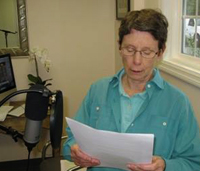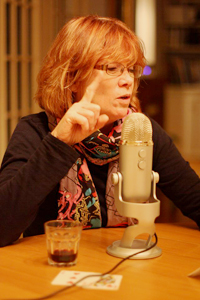William & Mary found in ‘Lost in Williamsburg’
A minute into the first episode, “Lost in Williamsburg” podcast listeners learn how high the stakes are.
“The lives of everyone in Williamsburg depend on what Thomas [Jefferson] and I are about to do,” Professor Jobriath says.
The fictional William & Mary professor is played by a real one – History Chair Fred Corney. Meanwhile, the young W&M student, Thomas Jefferson, is played by a young W&M student, Mark Hutchens.
They are two of the 31 performers in the serial audio drama, or “supernatural soap opera,” who are either William & May students, faculty or staff. Eleven more are family members of W&M people.
 All the more surprising is learning the creator of what is likely the only independent podcast in Williamsburg never attended W&M and doesn’t work at the university. Creator Phillip Merritt’s closest tie is his partner and English and Linguistics Professor Jack Martin.
All the more surprising is learning the creator of what is likely the only independent podcast in Williamsburg never attended W&M and doesn’t work at the university. Creator Phillip Merritt’s closest tie is his partner and English and Linguistics Professor Jack Martin.
But he needed voices, lots of voices, Merritt said, for the free podcast that launched in 2013 and is now 15 episodes into exploring whether the “charming little town of Williamsburg really is as quaint and quiet as it seems, or is there something sinister lurking amongst the town’s historic homes, B&Bs and campus courtyards?”
To find out, the show’s story weaves between the 18th century and present day, with characters including the young Thomas Jefferson, tavern owner and sorceress Hexabeth Blackhard and members of Cats with Benefits, a W&M rock band whose lead singer mysteriously disappears. William & Mary references abound, as do sly nods to everyday life and institutions in Williamsburg.
Recruiting Thomas Jefferson
Most of the students who participate, including Hutchens, learned about the podcast through fliers put up on campus that attracted the attention of the Science Fiction and Fantasy Club, or Sciffy.
“I heard about it first at a meeting of Sciffy,” said Hutchens ’17, a computer science and linguistics major. “So I went with a couple of my nerd friends to record parts. There’s a surprisingly large Science Fiction and Fantasy Club cast. There’s at least five, but a lot of them are bit parts.”
He landed the role as Jefferson, he believes, because he sent a test recording reading the Declaration of Independence. “I gave a couple of different takes with different confidence levels and that sort of thing,” he said, “then [Merritt] sent me the script for Thomas Jefferson and I was like, ‘Oh, great!’ Suddenly I had a major role.”
Merritt ended up recording different roles in different places, but made use of the soundproof Computational and Experimental Linguistics Lab in the basement of Tucker Hall for many of the student recordings.
That’s where he captured the voice of biology major Erin Roberts ’16 for a singing role. Roberts had performed for years with the Botetourt Chamber Singers and Sinfonicron Light Opera Company. She was in Williamsburg doing biological research over a summer when Jamie Bartlett, music chair and associate director of choirs, put out a call for singers to help with the podcast.
 “I got in touch with [Merritt] and he told me a little bit about his podcast and I was like, ‘Oh, this sounds cool,” she said. “He gave me the sheet music for it, so I spent about a week learning it, making sure I had it down.”
“I got in touch with [Merritt] and he told me a little bit about his podcast and I was like, ‘Oh, this sounds cool,” she said. “He gave me the sheet music for it, so I spent about a week learning it, making sure I had it down.”
Roberts performed “Sweet Isabelle” as barmaid Cecelia Blackhard, singing at a grand ball in the Governor’s Palace. The song was a finalist in the 2015 Audio Verse Awards, which celebrate the best in free audio drama from around the world. Nominations come from listeners.
“I was happy with how it turned out,” she said. “The sound equipment was good, I was happy with my performance. And it was an interesting song; [Merritt] composed it himself. I loved being a part of it.”
‘More or less anonymous’
Louise Menges had never done anything like the acting she did on the podcast as Margaret Souter, a shut-in owner of a local B&B who is obsessed with Williamsburg’s eerie history and mysterious goings-on. Menges retired from William & Mary in 2010 as a senior lab specialist responsible for the physical chemistry and instrumental analysis labs.
“I don’t think I could have done it, except it’s more or less anonymous,” she said. “It’s on the radio, so nobody sees me. I enjoyed it. It was a lot of fun, but if I had to do it on stage or in front of people, I don’t think I could have done it.”
Merritt said working with people like Menges is his favorite part of the podcast, which can take up to 40 hours per episode to write and produce.
“People are stretching beyond their boundaries and trying creative things,” he said. “It’s fun to get people to try these things and to see them loosen up as we’re recording.”
Mike Turner, director of programs and special projects in the W&M registrar’s office, is a self-described “current events nut” who only had to envision the day’s news to tap into the anger he needed for his villainous role.
 Turner was probably more comfortable behind the mic than many other actors; he used to do work in radio and on-camera and so he understood why he had to record the same line over and over with different inflections.
Turner was probably more comfortable behind the mic than many other actors; he used to do work in radio and on-camera and so he understood why he had to record the same line over and over with different inflections.
“The individual I was directing wasn’t there to respond,” he said. “So they do this a lot with animated movies, where they do multiple takes and then can choose which to use with the other recording.
“‘Aladdin’ is a good example. When they made ‘Aladdin,’ Robin Williams would tend to go off-book. This would be a problem in some projects, but his ad libs were so much better than the writing, they would have to go in and either redo the other character or use one of the multiple responses. That’s part of the reason his role is so funny and memorable. He’d add something and they’d just go, ‘We can’t leave that out.’”
The murder of George Wythe
Paul Hellyer, reference librarian with the W&M Law School’s Wolf Law Library, had some bit parts in “Lost in Williamsburg,” but was really inspired by it to launch his own podcast about the death of George Wythe.
“I already knew about the story,” he said. “George Wythe was our first law professor – the first one here at William & Mary, and the first one in the country. He was poisoned by his nephew in 1806, after he left Williamsburg and moved to Richmond. It was a fascinating story, so I thought it would make a good topic for a podcast.”
Most of the characters in the semi-historical drama “Murder of George Wythe” are portrayed by W&M law professors and students.
“My podcast is a lot simpler than Phillip’s,” he said. “He goes back and forth in time, there’s a lot of fantasy in it and a lot of characters. In ‘Murder of George Wythe,’ it’s strictly linear and the plot is more straightforward. It was a lot of fun. I had so much fun, I didn’t really notice the time.”
Best Actress goes to…
English Associate Professor Colleen Kennedy was involved with “Lost in Williamsburg” early as one of the show’s stars, Hexabeth Blackhard. Late last year she won Audio Verse’s Best Actress award for her performance.
 “It was really shocking when we got that award,” Kennedy said. “I share that award with Phillip because you do scenes over and over again until he gets it just right. My performance is as much his as it is mine.”
“It was really shocking when we got that award,” Kennedy said. “I share that award with Phillip because you do scenes over and over again until he gets it just right. My performance is as much his as it is mine.”
The show has picked up other acting, music and production nominations from Audio Verse and the Parsec Awards and was an official selection at 2016 HEAR Now: Audio Fiction and Arts Festival.
“I remember Phillip coming over to our place and him recording Colleen, and I was thinking, ‘What is going on here?’” said Chancellor Professor of Economics Will Hausman, Kennedy’s husband who later would take on the role of hapless Williamsburg resident Dale Souter. To save time, Merritt will often record the two in a quiet walk-in closet at their home.
“I didn’t anticipate it would be getting some of the nominations for these awards,” he said. “I just did it as a lark.”
Kennedy laughs when she recalls being downstairs while Hausman was upstairs screaming in the closet while recording a scene in which Dale makes a terrible discovery.
“I’m just hearing him screaming, over and over and over again,” she said, laughing. “If anybody had walked into the house…”
Though she plays the main villain, Kennedy said she sympathizes with the sorceress Hexabeth.
“I like her vindictiveness,” she said. “I guess that’s not a very nice thing to say, but I think Phillip did a good job of showing where it comes from. And I like the fact that she doesn’t take any crap from anybody. It was a very fun thing to play.”
Hausman said he thinks he has a “terrible voice” but took on the role to help out Merritt, who is a long-time friend of the family. (For his part, Merritt says Hausman has one of his favorite voices because it’s distinctive). He identifies with Dale as he takes issue with bureaucracy but judges him as too meek in relationships.
“Anybody who would ask somebody on a date to dinner and think that spaghetti with clam sauce is the best he can make is a little strange,” Hausman said.
And even though the couple are both main figures in the podcast, they are both just as eager to see how the drama wraps up as any other listener.
“It has been so much fun,” Kennedy said. “I want him to do the finale. I want that to go into the article: there has to be a finale.”
“I can’t wait to see where it’s going to go,” Hausman said. “It’s like ‘Game of Thrones,’ you just never know what’s going to happen.”
















